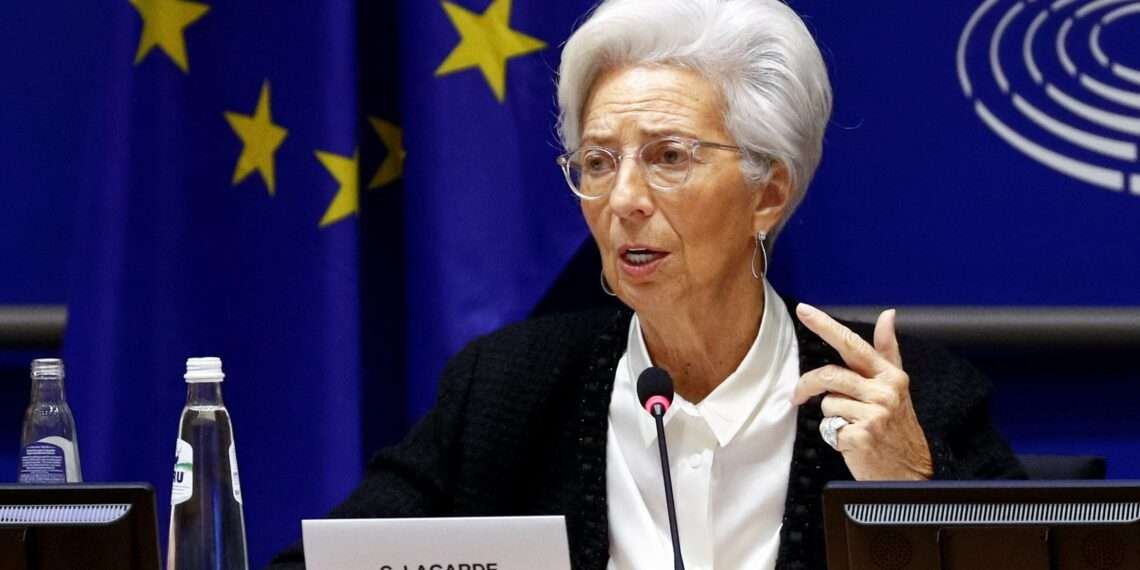Christine Lagarde, President of the European Central Bank (ECB), has stated that though the number of infections in Europe remains very high, the continent is moving out of the emergency phase of the pandemic due mainly to remarkable collective policy response.
According to her, GDP in the Eurozone is expected to exceed pre-pandemic levels in the first three months of this year.
“Consider that from the onset of the global financial crisis, it took seven years for euro area GDP to get back to its pre-crisis level. Today, we expect GDP to exceed its pre-pandemic level in the first quarter of this year. This difference owes much to Europe’s combined policy response”.
Christine Lagarde
She made this remarks in her Introductory statement at the meeting of the Conference of Parliamentary Committees for Union Affairs of the Parliaments of the European Union (COSAC) in Paris, on January 14, 2022.
She outlined three key directions that can help put Europe on the path of a lasting progress: providing stability, strengthening supply and ensuring strategic autonomy.
Providing stability
She highlighted that the ECB promptly launched a set of extraordinary measures to stabilize financial markets, secure monetary policy transmission and thereby defend price stability.
According to her, the Bank’s commitment to preserving favorable financing conditions provided a bridge to support firms, households and governments to the other side of the pandemic. “Together, we estimate that this saved more than one million jobs”, she said.
The rapid reopening of the economy has led to steep rises in the prices of fuel, gas and electricity. It has also led to prices increasing for durable goods and some services, as demand outstrips constrained supply. Year-on-year inflation in the euro area reached 5% in December, with around half coming from energy prices.
These same factors are in turn weighing on growth in the near term, which slowed at the end of last year, she stated. Higher energy prices are cutting into household incomes and denting confidence, while supply bottlenecks are leading to shortages in the manufacturing sector.
“We expect the drivers of inflation to ease over the course of this year. But we understand that rising prices are a concern for many people, and we take that concern very seriously. So let me reiterate that our commitment to price stability remains unwavering. We will take any measures necessary to ensure that we deliver on our inflation target of 2% over the medium term”.
Christine Lagarde
She underscored that monetary accommodation is still needed for inflation to settle at 2% over the medium term.
Strengthening supply
Monetary policy works on the demand side of the economy by stabilizing output around its potential level. But the level of potential output is mostly affected by the actions of other policymakers, besides the hard work of people and the strength of businesses. This, she said, called for the need to strengthen supply chains.
“There are structural changes taking place in the economy today which could have a profound impact on the supply side of the economy. The green transition, the digital revolution and demographic shifts have all been accelerated by the pandemic. If we are to achieve sustainable growth in the future, supply and demand need to move together as the economy adjusts to these changes”.
Christine Lagarde
Ms. Lagarde added that “We are fortunate in Europe that our policy response has not only focused on stabilizing demand, but also on redirecting supply towards the sectors of tomorrow”.
Ensuring strategic autonomy
The Former IMF Boss indicated that strengthening Europe’s strategic autonomy is vital as the digital realm is a global one where other economies have a head start. She underscored the need for the EU to act together on digital issues in order to remain in control of essential economic activities and set the highest standards for the citizens.
“And the ECB is also doing its share to prepare Europe for the new digital landscape, notably via the digital euro project. We are currently investigating the key issues raised by its design and distribution. When this work concludes, in 2023, stakeholders – including Members of the European Parliament – will need to decide on the way forward”.
Christine Lagarde
The ECB Boss explained that a digital euro would give people access to a simple, safe and reliable means of payment that is issued by the central bank, publicly guaranteed and universally accepted across the euro area.
“A digital euro would also provide new business opportunities and act as a catalyst for technological progress and innovation: European intermediaries would be in a position to improve the services they offer to their customers and stay competitive as new actors enter the payments landscape. This would also support Europe’s monetary and financial sovereignty”.
Christine Lagarde
Ms. Lagarde added that the digital euro would not replace cash. She also revealed that to coincide with the 20th anniversary of euro cash, the ECB has decided to launch a process of redesigning the banknotes to make them more relatable to Europeans of all ages and backgrounds.
READ ALSO: Dr. Bawumia Charges Central Banks in Africa to Connect to PAPSS




















